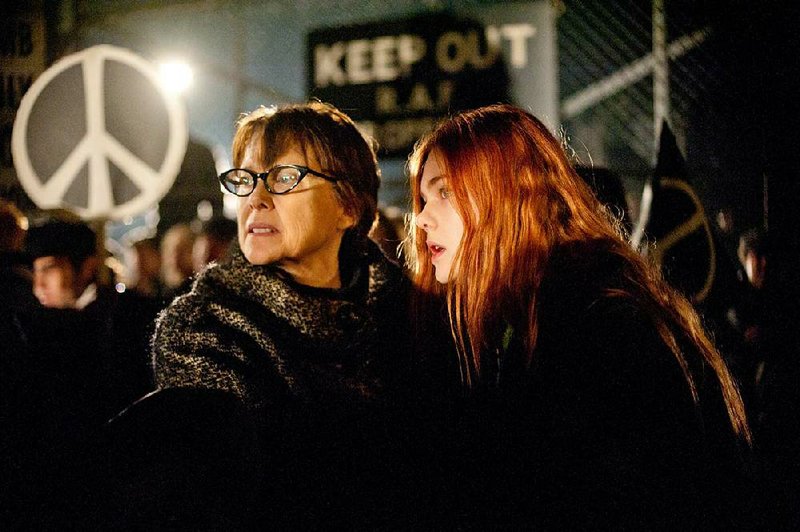It is sort of a happy accident that Sally Potter’s Ginger & Rosa opens in Little Rock on the same day as Jeff Nichols’ Mud. Both movies are about teenage friendships; anchored by remarkable performances by young stars; and realized by strong directors who evoke the inchoate sensations of adolescence through specific, telling details. Potter’s movie is set in London in 1962 - which was, as Philip Larkin wrote, “[b]etween the end of the Chatterly ban/And The Beatles’ first LP.” It captures something of the dire grayness of that era, before the 1960s became The Sixties, and it features a simply stunning performance by Elle Fanning, who was 13 when the cameras rolled.
Fanning is Ginger, the less mature of the titular duo. Her friend Rosa (Alice Englert) is already on the prowl for boys, straining for adulthood beneath the gray uncertain skies of the Cold War. Why defer growing up when the bombs might drop at any moment? The two mesh easily, seamlessly - born in the wake of Hiroshima, their mothers met in the maternity ward. They’ve grown up more as sisters than as neighbors on their austere working-class street, sharing secrets and the various heartbreaks that attend 17-year-old girls.
(According to published reports, Potter was initially resistant to hiring an American for the role, but Fanning was too impressive. While it’s difficult to argue with the result, it’s interesting to see Americans Alessandro Nivola, Oliver Platt and Christina Hendricks playing British characters. Usually it’s the British taking the jobs of U.S. actors.)
Rosa’s mum, Anoushka (Jodhi May), was abandoned by her dad, but Ginger’s parents are still technically together. Her glamorous father Roland (Nivola) is a bohemian intellectual, a writer and lecturer who went to prison as a conscientious objector during the war. Her mother,Natalie (Hendricks), was a painter who gave it all up for her family. While she has suffered plenty of indignities at his hands - he romanticizes his flings, he says he’s helpless to resist the “siren call of love” - she’s not above the sort of revenge-taking that Elvis Costello once labeled “emotional fascisim.”
Ginger and Rosa march against the bomb - Ginger out of a sense of duty to her radicalized parents, Rosa because she wants to meet boys. With Armageddon on the horizon, she worries that she’ll die before she can experience true love.
Fanning is very good indeed, especially considering she’s playing a character four years older than her actual age, but Englert may have the more complicated and richer character. Her Rosa is religious and pragmatic as well as boy-crazy. While Fanning has received most of the buzz, Englert (an Australian, by the way) more than holds her own.
Ginger & Rosa is probably Potter’s most accessible movie to date, but the script is perhaps nothing special, and you probably can imagine what eventually sets our young heroines at odds. More important are the tempered performances - Timothy Spall and Platt show up as Ginger’s gay godfathers, and Annette Bening has a smallish part as a radical American poet who serves as a corrective to all the British repression - and the deeply resonant details (including the girls soaking in the tub in their jeans to achieve the proper tight fit) that suggest autobiographical experience.
Ginger & Rosa 87 Cast: Elle Fanning, Alice Englert, Christina Hendricks, Jodhi May, Alessandro Nivola, Oliver Platt, Annette Bening Director: Sally Potter Rating: PG-13, for mature, disturbing thematic material involving teen choices - sexuality, drinking, smoking and language Running time: 90 minutes
MovieStyle, Pages 31 on 04/26/2013
